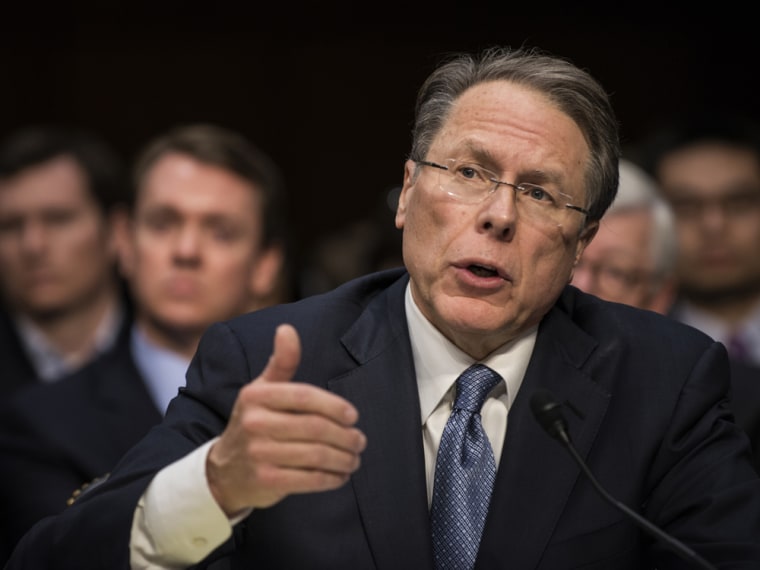Gun groups, defense contractors, oil companies and the world’s largest social network increased their spending on lobbying last quarter, bucking an overall downward trend, newly filed congressional disclosures show.
As debate over gun control raged in the Senate, the National Rifle Association, the National Shooting Sports Foundation and Mayors Against Illegal Guns each spent more on federal-level lobbying during the year’s first three months than in any other quarter.
Raytheon, United Technologies and General Dynamics also fired up their lobbying machines from January to March, easily surpassing their spending from the same period one year ago as budget sequestration forced them to face deep cuts to their bottom lines.
Northrop Grumman, at $5.8 million, posted its third-biggest lobbying quarter in company history.
And Facebook’s $2.45 million in first-quarter lobbying expenses obliterated its previous quarterly record — $1.4 million during the final three months of 2012 — as it pressed lawmakers and governmental agencies on a variety of issues, from online advertising and privacy concerns to taxation and supporting visas and permanent residency for highly skilled foreign workers.
But those are exceptions.
About three-fifths of the nation’s 100 top lobbying organizations spent less on lobbying during the year’s first quarter than the first quarter of 2012, a Center for Public Integrity analysis of congressional disclosure reports and Center for Responsive Politics data indicates.
A slight majority of them also spent less on lobbying from January through March than they did from October through December — a period on Capitol Hill marked by an election, then a congressional recess-induced lull interrupted by a flurry of fiscal cliff activity at the end of the year.
The U.S. Chamber of Commerce this quarter retained its perennial perch atop the list of top lobbying spenders, although its collective first-quarter output ($16.8 million, when including affiliates) is dramatically down from recent quarters.
The Chamber spent nearly $26.4 million during last year’s first quarter. During the final quarter of last year, it spent more than $40.6 million, in large part because it ranks among a small group of lobbies that opt to disclose state- and grassroots-level lobbying (and sometimes political organizing) costs alongside federally focused efforts.
Attribute the recent drop-off to 2013 not being an election year, Chamber spokeswoman Blair Latoff Holmes said, noting that the nation’s largest trade group still spent heavily on its policyagenda to “generate stronger, more robust economic growth and create jobs.”
That, according to its disclosures, included lobbying on implementation of the Dodd-Frank Wall Street reform law as well as the oversight capabilities of the newly created Consumer Financial Protection Bureau.
Google’s lobbying expenditures have been on a torrid pace of late, as the omnipresent Internet company jumped from $1.5 million during the first quarter of 2011 to $5.4 million during the first quarter of 2012. But it throttled back this past quarter, spending less than $3.4 million on a range of topics that include federal regulation of online advertising and consumer privacy.
Among the dozens of other prominent lobbies that spent less during the first quarter than they did during the same period last year: AT&T ($7.1 million to $4.3 million), General Electric ($5.7 million to $5.2 million), the American Hospital Association ($4.5 million to $3.8 million), Verizon Communications ($4.6 million to $3.7 million), Dow Chemical ($3.3 million to $2.7 million), drug maker Pfizer ($3.6 million to $2.9 million) and the American Bankers Association ($2.7 million to $1.6 million).
While many defense contractors experienced lobbying growth early this year, Boeing and Lockheed Martin experienced slight spending declines during the first quarter compared to the same period last year.
Of those that spent more, the National Association of Realtors ($6.1 million to $8.5 million) led all others in overall first quarter spending. But like the U.S. Chamber of Commerce, the Realtors association reports its lobbying activity broadly, and their first quarter spending was significantly down from the final three months of 2012, when it burned through nearly $15.5 million.
Many oil-related companies and associations reported first-quarter lobbying spikes, including ExxonMobil ($4.2 million to $4.8 million), Koch Industries ($2.3 million to $2.6 million), Chevron ($3.2 million to $3.7 million), the American Petroleum Institute ($1.8 million to $2.1 million) and Occidental Petroleum ($1.6 million to $2.1 million).
The American Medical Association, CTIA-The Wireless Association, AARP, Altria, America’s Health Insurance Plans and the National Association of Manufacturers also recorded mild to moderate increases.
While not among the nation’s biggest lobbying spenders, the National Rifle Association spent $810,000 during the first three months of the year to lobby the federal government — the most ever during a first quarter.
Senate Republicans, aided by a few Democrats, have so far blocked passage of all major gun control legislation championed by President Barack Obama and most Democrats.
Meanwhile, Mayors Against Illegal Guns spent a quarter-million dollars from January through March — five times what it typically does.
The organization, led by New York City Mayor Michael Bloomberg and Boston Mayor Tom Menino, had never spent more than $60,000 during a single quarter to lobby the federal government.
The Center for Public Integrity is a nonprofit, non-partisan investigative news organization in Washington, D.C. For more of its stories on this to go publicintegrity.org.
More from Open Channel:
